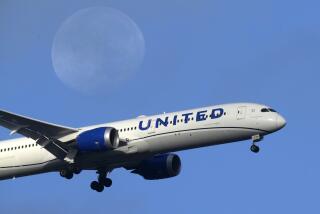Cash-back cards may be a better ‘buy’ than airline credit cards. What’s better?

If you use an airline-affiliated credit card such as the American Airlines Aadvantage MasterCard, consider a cash-back card instead. Airline cards are great if you’re a big spender: Charge $25,000 and you might earn a round-trip domestic flight. But most people don’t charge enough, or quickly enough, to earn an award ticket.
Some cash-back cards refund 2% on everything you buy with them, so if you spend $12,000 you’ll get back $240, enough for a free flight from L.A. to New York (the last time I checked, a nonstop flight in June on United Airlines cost $243 round trip).
But there’s more: Cash-back cards are more appealing thanks to sign-up bonuses and, unlike airline-affiliated cards, all of which have annual fees, most cash-back cards have none.
But the biggest reasons to switch to a cash-back card are the rules you may unknowingly agree to abide by, and fees that you agree to pay, when you join a frequent-flier program.
Miles and points may expire if your account has no activity; cash doesn’t unless you spend it. On some airlines your miles and points expire when you do; you can bequeath cash to whomever you like.
Frequent-flier seats are subject to blackout dates; you can spend cash on any flight you choose. And airlines devalue miles and points by increasing the number needed to fly “free,” with little or no warning. Cash is only subject to moderate inflation.
And yes, I wrote “free,” because many frequent-flier awards are subject to fees and co-pays: a mysterious $200 fee on an economy class ticket from L.A. to London; a $75 fee for a flight booked 21 or fewer days before departure; a $150 fee if you cancel or change your trip; and a co-pay of up to $550 each way to upgrade from economy to business or first class.. Don’t forget the $95 credit card fee you pay each year for the privilege of earning those miles.
The airlines have added these fees and devalued their loyalty programs with such stealth that most members didn’t notice. Miles- and points-obsessed consumers are like the proverbial frog in a gradually heated pot. By the time we noticed what was going on, we were hooked — and cooked.
Which cash-back cards offer the best value? Try these:
♦Citi Double Cash Card: No annual fee; 2% on everything you purchase.
♦Fidelity Rewards Visa Signature Card: No annual fee; 2% on everything you buy. The only catch is that you must have a Fidelity money market or retirement account — or open one — because the rebate goes into that account.
♦Capital One Savor Rewards Card: No annual fee the first year, then $95. $500 bonus after you spend $3,000 in the first three months; 1% on all purchases, plus 4% on dining and entertainment and 2% on groceries.
♦Chase Freedom Unlimited: No annual fee. 1.5% on all purchases, plus a $150 bonus after you spend $500 in the first three months.
♦ Wells Fargo Cash Wise Visa card: No annual fee. 1.5% on all purchases, plus $200 after you spend $1,000 in the first three months; 1.8% on purchases made with ApplePay or GooglePay in the first 12 months.
Let’s do the math
A $15,000 spend on an airline credit card earns 15,000 miles, not enough for most domestic round-trip tickets; the same amount on the Fidelity or Citi cards earns $300. The Capital One card, assuming that you earn the $500 bonus and spend $500 on restaurants or entertainment and another $500 on groceries, returns $940
Apply for your cash-back card with the issuing bank and not through websites that purport to advise which cards are best. Banks pay these sites millions each year in referral commissions; when a card issuer stops paying its listing is pulled.
The fees these websites receive from banks get “baked” into the credit card fees, penalties and interest rates all consumers end up paying.
More to Read
Sign up for The Wild
We’ll help you find the best places to hike, bike and run, as well as the perfect silent spots for meditation and yoga.
You may occasionally receive promotional content from the Los Angeles Times.






